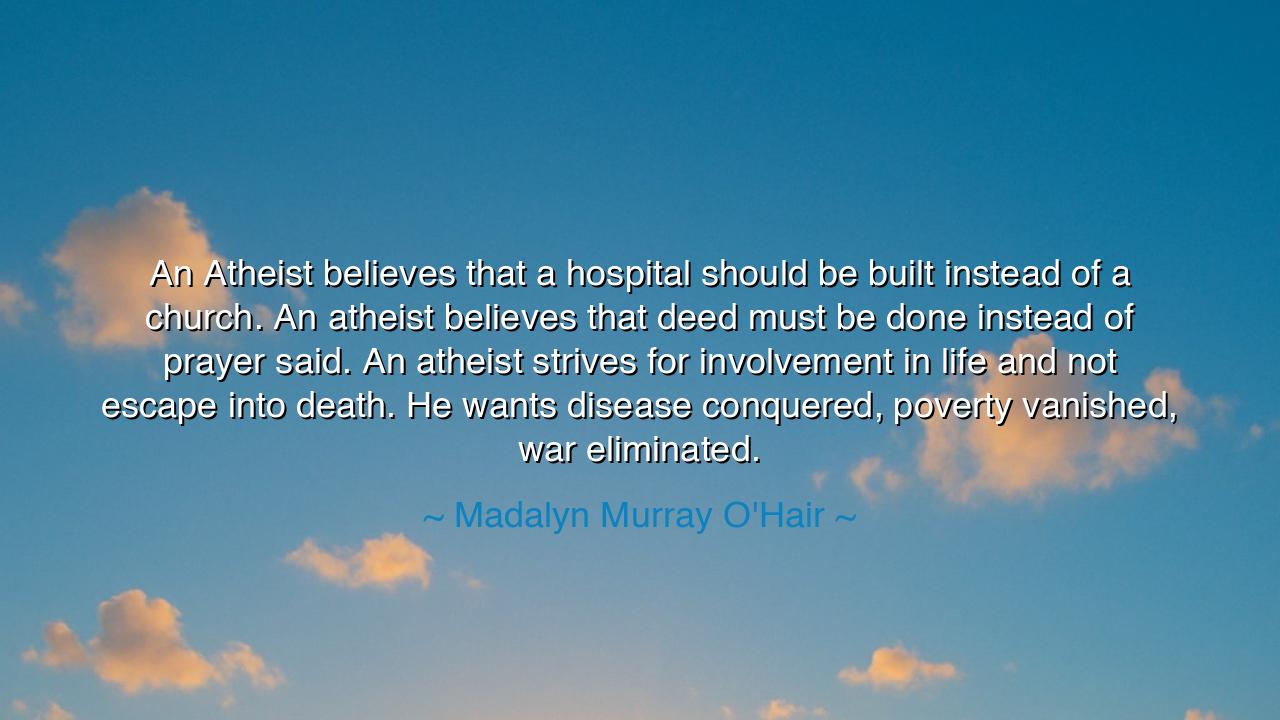
An Atheist believes that a hospital should be built instead of a
An Atheist believes that a hospital should be built instead of a church. An atheist believes that deed must be done instead of prayer said. An atheist strives for involvement in life and not escape into death. He wants disease conquered, poverty vanished, war eliminated.






In the fiery and uncompromising words of Madalyn Murray O’Hair, we hear the voice of rebellion against complacency, and the call to ground the sacred in the soil of the living: “An Atheist believes that a hospital should be built instead of a church. An atheist believes that deed must be done instead of prayer said. An atheist strives for involvement in life and not escape into death. He wants disease conquered, poverty vanished, war eliminated.” These words are not the cry of a soul lost to faith, but the declaration of one who believes that the true holiness of humanity is found in action, not in supplication. O’Hair’s vision is of a world where redemption is not begged for, but built—brick by brick, hand by hand, through the living labor of compassion and reason.
The origin of this quote lies in the fierce mind and turbulent life of Madalyn Murray O’Hair, the founder of the American Atheists movement and one of the most controversial figures in modern American history. Known for her successful role in the Supreme Court case Murray v. Curlett (1963), which led to the banning of compulsory prayer in public schools, O’Hair stood not merely as a challenger of religion, but as a defender of intellectual freedom and human responsibility. Her words, taken from her writings and speeches on atheism, capture her lifelong struggle against blind faith and passive hope. To her, the greatest virtue was not belief but courage—the courage to act without the safety net of divine intervention, to take upon human shoulders the full burden of human suffering.
O’Hair’s message was, in truth, ancient. The philosophers of old—Epicurus, Lucretius, and later Spinoza—also taught that man must seek salvation not in another world but in this one. Epicurus wrote that “it is impossible to live pleasurably without living wisely and justly,” meaning that virtue and happiness must be the fruits of our own effort, not gifts of the gods. Likewise, O’Hair’s atheism is not a denial of morality, but an exaltation of human potential. To her, building a hospital instead of a church was not blasphemy, but reverence for life itself—the recognition that healing the sick is the truest form of prayer. She saw the scientist, the teacher, the doctor, and the builder as priests of a new faith: the faith in humanity’s power to do good without fear of the heavens.
Consider the story of Florence Nightingale, who walked through the blood-soaked fields of Crimea to tend to the wounded. Though born into a world of prayer and piety, she chose deeds over words. Her work revolutionized medicine and nursing, saving more souls through science and care than any sermon ever could. Whether one believes in God or not, the lesson of her life—and of O’Hair’s words—is the same: that the sacred act is not to pray for a better world, but to make one. Each cure discovered, each child educated, each injustice overturned—these are the hymns of a living faith in human goodness.
And yet, O’Hair’s words carry not only defiance but also compassion. When she says the atheist “strives for involvement in life and not escape into death,” she is speaking against the temptation to withdraw from the world’s pain by imagining a paradise beyond it. Her vision demands engagement, not retreat. She asks us to confront suffering face to face—to meet it with reason, empathy, and effort, not with resignation. In this way, she joins the lineage of thinkers like Albert Camus, who taught that meaning is not found in divine decree, but in the act of rebellion against despair. To live fully, to love deeply, to serve others—that is to triumph over the silence of the cosmos.
There is a quiet heroism in O’Hair’s creed. To believe in a god is easy when life is cruel, for it offers comfort; to believe in the power of humanity in the face of death and darkness is far harder. The atheist, in her vision, is not one who denies the sacred, but one who redefines it. His church is the world; his altar, the human heart; his prayers, the actions that lift another out of suffering. In such belief, there is no surrender—only steadfast labor for the betterment of all. It is a call to live so that one’s works, not one’s words, are remembered; to seek immortality not through faith in heaven, but through the love and progress we leave behind on earth.
So, my child of tomorrow, heed the wisdom within these burning words: do not wait for the divine to deliver what your hands can create. Build your hospitals—not only of stone, but of kindness. Speak not your prayers, but perform your deeds. When you see disease, fight it with knowledge; when you see poverty, answer it with compassion; when you see war, oppose it with peace born of courage. Let your belief, whether in God or in humanity, be measured not by your words, but by the good you do.
For in the end, Madalyn Murray O’Hair’s vision is not merely atheistic—it is profoundly humanistic. It is a gospel of action, a call to arms for all who would live consciously and purposefully in this world. Whether one worships in temples or in laboratories, her truth remains: that to serve life is the highest form of worship, and to uplift others is the purest form of faith. In the temple of existence, let your works be your prayers, and your love be your proof that humanity, not heaven, is our greatest hope.






AAdministratorAdministrator
Welcome, honored guests. Please leave a comment, we will respond soon